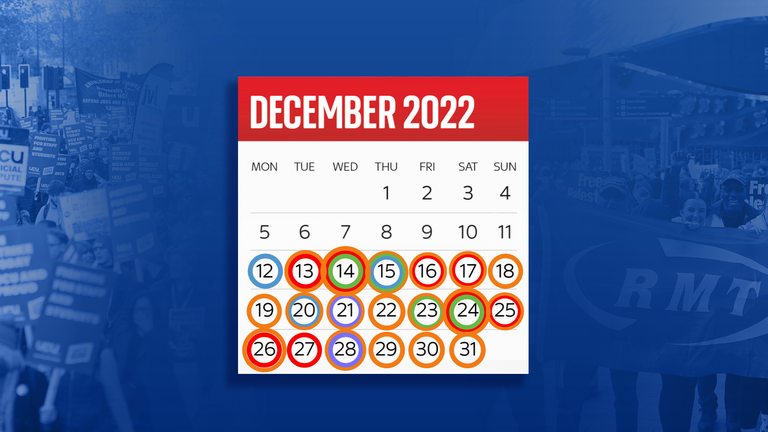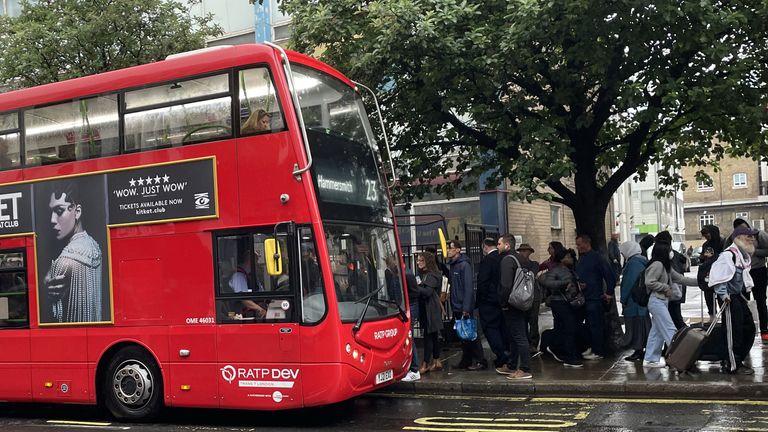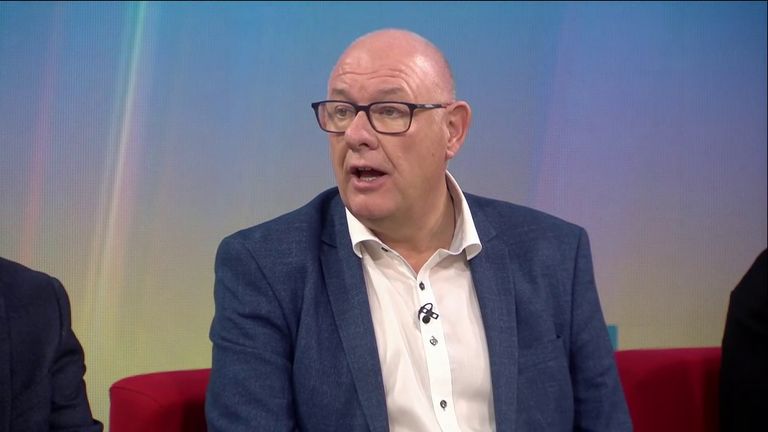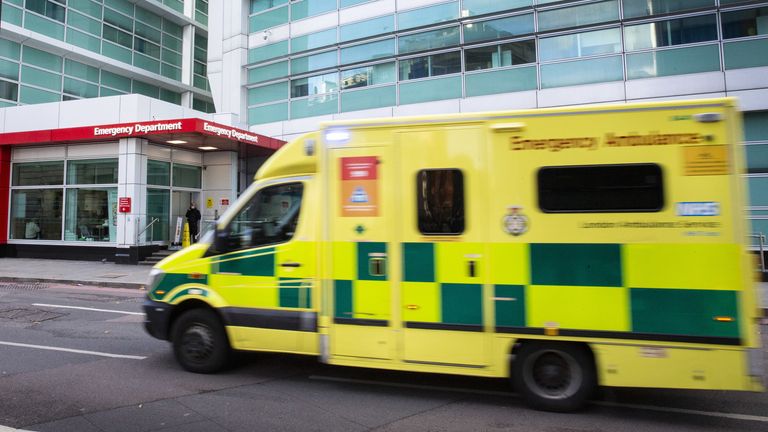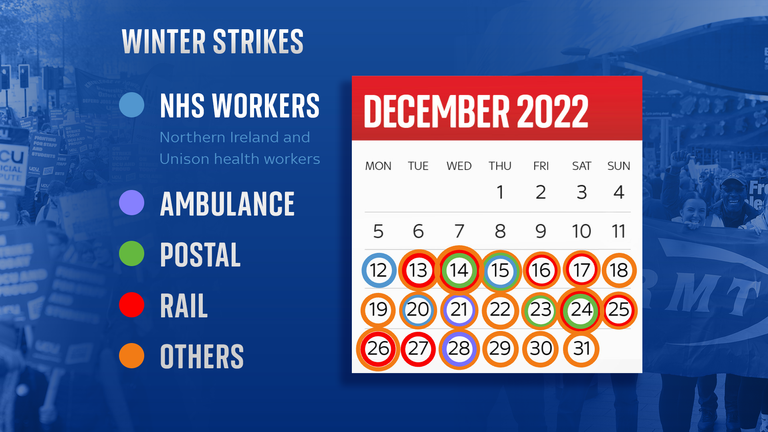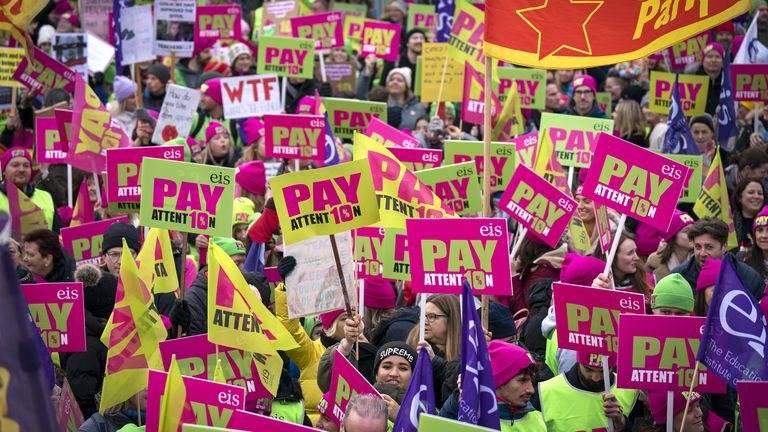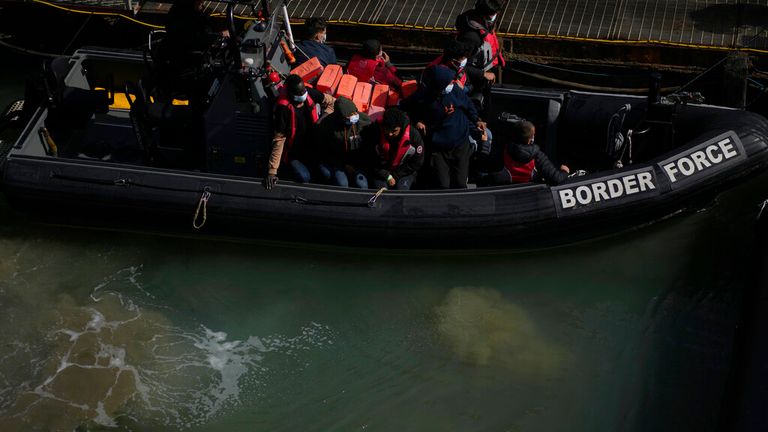Strikes every day before Christmas - which sectors are affected and why
Workers from a host of industries have voted to strike, or are balloting to strike soon, as most call for pay rises in line with, or above, inflation while the cost of living soars across the UK.
Friday 23 December 2022 13:53, UK
The UK is facing a wave of strikes this winter, with at least one walkout a day before the end of the year, as staff from different industries seek better pay.
From transport to the NHS, education to delivery drivers, tens of thousands of workers are expected to take action as recession grips the UK and the cost of living rises.
Sky News looks at the industries that are striking and why.
Transport
Rail
Further rail strikes are set to take place from 6pm on Christmas Eve to 29 December and 3-7 January.
Eurostar strikes take place on 22 and 23 December.
Workers on London's Elizabeth Line will strike on 12 January
Various unions have planned rail strikes this winter.
The Rail, Maritime and Transport Workers (RMT) union represents Network Rail workers, who operate railway infrastructure such as signals, and workers at 14 of the UK's 28 train companies.
RMT general secretary Mick Lynch is arguably the most well-known union official and said his members are striking in response to the government cutting jobs and refusing to increase pay in line with inflation.
He also said the government wants to make changes to the railway pension scheme by reducing benefits and making staff work for longer while paying increased contributions - so they will have less money in their pension pots.
Mr Lynch said the government plans to "attack" terms, conditions and working practices by using "fire and re-hire" and cut real-terms pay for most members through lengthy pay freezes and below RPI inflation pay rises.
The RMT wants a pay rise, which it has not put a figure on, and reassurance jobs will not be cut, as well as working practices and conditions protected.
Aslef, which represents train drivers at 15 companies, is also striking, with its members wanting a "proper" pay rise to help with the increased cost of living as they say they have not had a pay increase since 2019.
The union said a number of train companies "have their hands tied" by the Department for Transport so are unable to negotiate a "reasonable deal", which is why they are striking.
They had already announced they were joining other unions on strike but added another date of 5 January ahead of Christmas, saying the train companies "have pushed us into this place".
The Transport Salaried Staffs Association (TSSA) announced on 21 December its members who work at CrossCountry, Great Western Railway and West Midlands Trains will walk out between 26 and 29 December.
RMT members who are security staff on the Eurostar, some who earn £10.66 an hour, will walk out after refusing a below-inflation pay offer.
Workers on London's Elizabeth Line will strike on 12 January in a dispute over pay and pensions, Prospect and the TSSA rail union have announced.
Bus
Stagecoach strikes in Sunderland will take place on 23-24 December and 26-27 December.
GMB members who work as bus drivers for Stagecoach in Sunderland are striking over "real-term pay cuts" as they say the company is refusing to negotiate.
Stagecoach North East disputes this and says an offer has been made that would make those drivers "amongst the highest paid of any bus drivers in the region".
Roads
Staggered strikes across English regions until 7 January.
22-25 December: London and South East. 30-31 December: West Midlands and South West. 3-4 January: All areas. 6-7 January: East Midlands and Eastern.
National Highways employees, who plan, design, build, operate and maintain the country's roads, will take part in a series of "staggered" strikes in England.
Their union, PCS, says the action risks bringing the road network to a standstill and that the walkouts will coincide with the planned strikes by RMT members on the railways.
Traffic officers help keep the roads moving and users safe through planning and delivering schemes as well as providing key safety services such as rolling road blocks, smart motorways and lane closures.
Their dispute is over pay, pensions, job security and redundancy terms.
Air
29 December from 4am for 72 hours
A strike planned by a total of 350 baggage handlers employed by Menzies at Heathrow airport due to start on 16 December has been suspended.
Unite says this came after last-ditch talks as a "gesture of goodwill".
A further 72-hour strike is planned for 29 January if a deal can't be struck.
Unite said it would affect passengers using Air Canada, American Airlines, Lufthansa, Swiss Air, Air Portugal, Austrian Airlines, Qantas, Egypt Air, Aer Lingus and Finnair.
What promises to be more disruptive is PCS union members, working for UK Border Force, going on strike between 23-26 and 28-31 December.
Unite members working for Highlands and Islands Airports will be striking on 22 December.
Click to subscribe to the Sky News Daily wherever you get your podcasts
Postal
Further Royal Mail strikes take place on 23-24 December.
Members of the Communication Workers Union (CWU) are walking out in a long-running dispute over pay and Royal Mail's modernisation plans, which include 6,000 redundancies and delivering parcels on Sundays, with no letters on Saturdays.
The strikes are going ahead after Royal Mail said it had delivered a "best and final" offer to the union, including a number of "extensive improvements".
Royal Mail has said it offered workers a pay rise of up to 9% over 18 months, a new profit share scheme for employees and more generous voluntary redundancy terms.
However, the CWU said Royal Mail's offer would turn the company into a "gig economy-style parcel courier, reliant on casual labour".
Read more:
Will I still get my letters and parcels?
NHS
Nurses
Further nursing strikes in England will take place on 18-19 January
Members of the Royal College of Nursing went on strike in December for the first time ever following the government failing to commit to formal pay negotiations after a five-day deadline ended in November.
Thousands of NHS nurses in England, Wales and Northern Ireland went on strike on 15 and 20 December as they call for a rise of 5% above inflation - 19.2% - as they said they have had a real terms pay cut of 20% since 2010.
They are also calling for better working conditions as nursing vacancies are at a record high so staff are stretched and regularly working beyond their shifts without extra pay.
The strikes resulted in thousands of cancelled NHS operations and appointments.
The RCN have since announced that nurses will strike again in England on 18 and 19 January and said further dates would be confirmed in the new year.
The impact of the strikes will be widened, with the number of trusts involved increasing from 44 to 55.
Ambulance staff
Strikes take place on 11 and 23 January.
Thousands of ambulance workers and other NHS staff are striking in a wave of coordinated industrial action.
The first strike took place a day after members of the Royal College of Nursing staged their second walkout, also over pay.
Around 25,000 paramedics, emergency care assistants, ambulance technicians, call handlers and other 999 crew members from the Unison, GMB and Unite unions walked out across England and Wales on 21 December.
The GMB union had planned another strike on 28 December, but decided to suspend the walkout after "amazing" public support for its industrial action.
On 22 December Unison announced its members would stage further walkouts on 11 and 23 January involving staff employed in London, Yorkshire, the North West, North East and South West.
Junior doctors
Junior doctors - any doctor below consultant level - who are BMA members will be balloted to strike on 9 January 2023.
They say they have had a real terms pay cut of 26.1% since 2008, while their work has increased and morale is plummeting after working through the pandemic with "only valueless claps".
Junior doctors were guaranteed a 2% pay rise in 2022/23 but that was agreed before the pandemic when inflation was below 2% so the BMA has said it is actually a pay cut.
They were also excluded from the 4.5% increase the rest of the NHS has been promised. A potential strike date has not been set.
Other NHS staff
Five other unions are balloting for strike action, which could be co-ordinated, by NHS staff who are not junior doctors or nurses, including ambulance staff, midwives, physios, and hospital porters.
Chartered Society of Physiotherapy members in Scotland have voted to strike in the next six months but will consider an offer from the Scottish government of a salary rise of 7%, or 11% for the lowest paid.
Physios in England and Wales were balloted until 12 December as the union calls for pay rises in line with inflation.
The Royal College of Midwives is balloting its members, who are midwives and maternity support workers, for industrial action after it rejected the government's 4% pay rise offer as it is below inflation.
Unite, the UK's second biggest union, is also balloting 10,000 NHS members ahead of Christmas for strikes in early 2023.
NHS Unite members currently being balloted include: dentists, healthcare scientists, applied psychologists, counsellors and psychotherapists, audiologists, optometrists, builders, estates and maintenance staff, administrators, ICT help and support services such as porters and cleaners.
Ambulance workers who are Unite members across Scotland, England and Wales have already voted to carry out a work-to-rule and overtime ban after rejecting the NHS's pay offer of a 4% pay increase. Dates are yet to be set.
Unison, the UK's largest union, is balloting 350,000 NHS employees across England, Wales and Northern Ireland as it has rejected the government's 4% pay rise offer.
The union represents a wide range of NHS staff, including porters, nurses, paramedics and cleaners.
Thousands of Unison workers who are ambulance workers in the North East, North West, London, Yorkshire and the South West have voted to strike but dates have not been set and exact areas not yet confirmed as the vote was just below the 50% threshold for many NHS trusts.
Unison has suspended its ballot in Scotland as they consult on the Scottish government's offer of a flat rate of just over £2,200, which is worth more than 11% to the lowest paid, after an initial offer of 5%.
GMB union members, including nurses, ambulance workers, hospital porters, cleaners, caterers, clerical staff, technicians, care workers, social workers and transport workers in Northern Ireland have voted to strike - expected to happen before Christmas.
Firefighters
More than 33,000 firefighters and control room staff started voting on 5 December on whether to strike over pay.
Members of the Fire Brigades Union (FBU) are being asked if they want to take industrial action over a "derisory" 5% pay rise.
FBU general secretary Matt Wrack said: "Strike action will always be a last resort but we are running out of options.
"Many firefighters and control staff are desperate. Some are struggling to afford to live. It is a dreadful and very serious state of affairs."
Education
Teachers in Scotland walked out on 24 November as they called for a 10% pay rise - which Scottish authorities say they cannot afford - and better working conditions.
Further walkouts took place on 7 and 8 December by members of the Scottish Secondary Teachers' Association and the NASUWT.
University lecturers, librarians, and researchers at 150 UK universities also went on strike on 24 and 30 November and 1 December in the biggest action of its kind in higher education - with more dates threatened.
The University and College Union said lecturers and other academic staff had suffered a decade of below-inflation pay rises, with a 3% increase announced in the summer.
It is demanding a pay rise in recognition of the cost of living crisis, an end to insecure contracts and wants employers to reverse pensions cuts imposed this year that it claims will lead to the average member losing about 35% of their future retirement income.
University administrators, cleaners, security, and catering staff at 19 universities, who are Unison members, will also take action.
Civil servants
Border Force officers will go on strike at Birmingham, Cardiff, Gatwick, Glasgow and Manchester airports, as well as terminals 2, 3, 4, 5 at Heathrow and the Port of Newhaven from 23-26 and 28-31 December.
Staff at the Rural Payments Agency are staging further walk outs on 19-23 December and 3-6, 9-13 January.
More than 200 Department for Work and Pensions staff at three offices in Liverpool and one in Doncaster are walking out from 19-31 December.
Around 100,000 civil service members of the Public and Commercial Services Union (PCS) began a month of strikes from mid-December as they call for a 10% pay rise, better pension conditions, job security and to scrap planned redundancy reforms.
Those working for the Home Office, including Border Force staff, the Department for Transport, including the DVLA and Driver and Vehicle Standards Agency, and the Department for Environment, Food and Rural Affairs, including the Rural Payments Agency, will go on strike.
The government has said they "greatly value" civil servants' work but their demands would cost £2.4bn, which it said is "unaffordable" at the moment.
Food delivery
Strike dates will be announced for the Christmas period.
Almost 400 GMB members who work for Bestfood and deliver food to chain restaurants such as KFC, Burger King, Pizza Hut, Zizzi, Pizza Express and Wagamama have voted to strike.
GMB said Bestfood's parent companies - Booker and Tesco - are "making serious money while the people who do the graft are struggling to make ends meet".
The union said it wants a pay deal to protect drivers from the cost of living crisis.
Anyone who likes Haywards Pickled Onions over the festive season should take note of a factory strike.
The Mizkan Euro factory in Rochdale has already seen 20 days of lost output as a result of a pay dispute.
Homeless charity staff
More than 600 workers at the housing and homeless charity Shelter went on a planned and unprecedented fortnight of strike action on 5 December in a dispute over pay.
Unite said a 3% pay increase this year has left many of Shelter's own staff unable to pay their rent.
The strike ended early after 10 days following an increased pay offer of 7% plus a one-off payment of £1,250.

